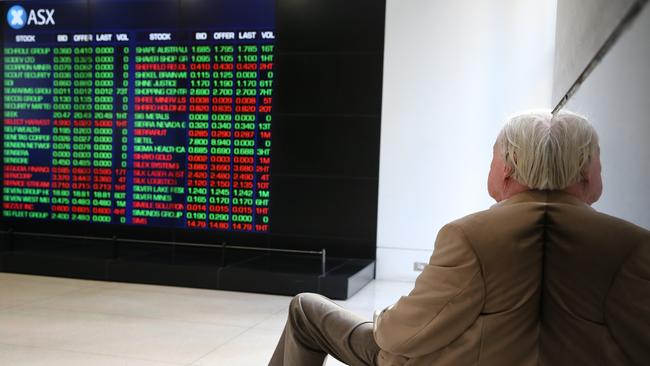Investors concerned central banks will tip global economy into recession to kill off inflation
The local sharemarket is expected to open up slightly higher on Monday after a 1 per cent rise on Wall Street and ahead of the release of crucial inflation data.

The local sharemarket is expected to open up slightly higher on Monday after a 1 per cent rise on Wall Street and ahead of the release of crucial inflation data.
The Australian Bureau of Statistics will report December quarter inflation figures on Wednesday – the outcome is likely to dominate markets as investors watch for any sign central banks will continue to push interest rates higher.
Westpac economists expect the data to show a 1.5 per cent quarter-on-quarter rise, taking the annual inflation figure to 7.4 per cent.
Although a step down from the 1.8 per cent leap in the third quarter, the Reserve Bank is still likely to shift rates higher by 75 basis points over the next three months. Starting with a 25bp hike in February, economists fear it will stall economic growth and potentially push the country into recession.
Giving some hope to local investors however is the upcoming reporting season, with early trading updates from JB Hi-Fi, Super Retail and Michael Hill International showing strong consumer spending ahead of Christmas.
The ASX 200 closed at 7452.2 points on Friday, with SPI futures pointing to a 0.5 per cent rise at the open on Monday. On Wall Street, the Dow Jones Industrial Average gained 331 points, or 1 per cent, on Friday to end a three-day losing streak, while the S&P 500 rose 1.89 per cent. The tech-heavy Nasdaq Composite rallied 2.66 per cent, its largest one-day gain in six weeks.
Despite the strong rally on Friday, US and European sharemarkets had pulled back over the last week on the back of recession and earnings worries and hawkish comments from ECB president Christine Lagarde, who said inflation remains “way too high”.
“Markets are tossing up how much more interest rate tightening we have to come off the tail end of the cycle, and potentially when central banks may have scope to start easing or even signalling an easing,” Westpac senior economist Matthew Hassan said.
“And that is really about a cue for a risk-on move … that is sort of a green light for risk assets. But at this stage it’s still some way off and the question is how far off.”
Mr Hassan said his view is the further 75bp tightening to come by the RBA across three rate hikes will slow the economy abruptly and drag growth back to just 1 per cent, which will essentially stall the economy through 2023.
“That implies a contraction in per capita GDP, it’s not what you would call a full-blown recession but a tight setting and a very weak result for the economy,” he said, adding that stubbornly high inflation would not allow central banks to ease monetary policy even with the economy slowing.
“So I think for investors, I think there is light at the end of the tunnel in this tightening cycle but they will be wary about dumping too early, that the signals from the US Federal Reserve are telling us that they are going to maintain tight settings most likely throughout this year, and getting the timing right is the challenge.
Among other local data to be released in the week is the National Australia Bank’s business confidence index for December – out on Tuesday – which is likely to remain soft. Overseas, the December quarter GDP figures for the US are due on Thursday and are forecast to show annualised growth of 2.6 per cent, compared to 3.2 per cent in the September quarter.
AMP chief economist Shane Oliver is tipping a better outlook for markets, albeit with lots of bumps along the way.
“A re-test of 2022 sharemarket lows remains a risk on the back of recession and earnings worries and maybe US debt ceiling brinkmanship around mid-year,” he said. ”But the combination of falling inflation, central banks becoming less hawkish and global growth holding up better than feared is expected to result in stronger share markets this year and some further decline in bond yields.”
AMP expects rates to remain on hold next month.
“The RBA has done enough … to bring inflation back to target and that it should and will pause in February to avoid the risk of unnecessarily tipping the economy into recession,” Dr Oliver said.





To join the conversation, please log in. Don't have an account? Register
Join the conversation, you are commenting as Logout